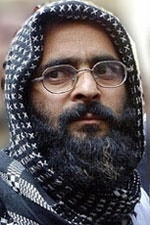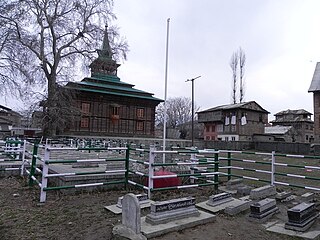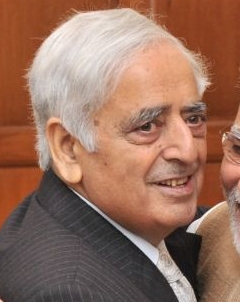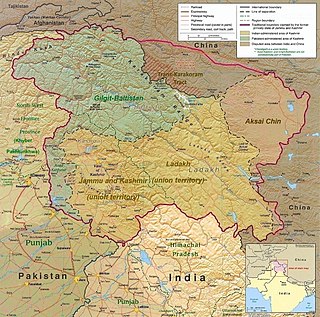
Diwali is a festival of lights and one of the major festivals celebrated by Hindus, Jains, Sikhs and some Buddhists, notably Newar Buddhists. The festival usually lasts five days and is celebrated during the Hindu lunisolar month Kartika. One of the most popular festivals of Hinduism, Diwali symbolizes the spiritual "victory of light over darkness, good over evil, and knowledge over ignorance". The festival is widely associated with Lakshmi, goddess of prosperity, with many other regional traditions connecting the holiday to Sita and Rama, Vishnu, Krishna, Yama, Yami, Durga, Kali, Hanuman, Ganesha, Kubera, Dhanvantari, or Vishvakarman. Furthermore, it is, in some regions, a celebration of the day Rama returned to his kingdom Ayodhya with his wife Sita and his brother Lakshmana after defeating Ravana in Lanka and serving 14 years of exile.

Syed Ali Shah Geelani was an Islamist, pro-Pakistan separatist leader in Jammu and Kashmir, regarded as the father of insurgency in Kashmir. He was a member of Jamaat-e-Islami Kashmir between 1953 and 2004, and regarded as one of its top leaders. He left Jamaat in 2004 and founded Tehreek-e-Hurriyat, a key constituent of the All Parties Hurriyat Conference (APHC), a conglomeration of separatist parties in Kashmir. Geelani served as the Chairman of the Hurriyat Conference until he quit the group in June 2020. Geelani was also a three-time Member of the Legislative Assembly from the Sopore constituency, elected on a Jamaat-e-Islami ticket in 1972, 1977 and in 1987. He was the most popular leader in Kashmir after the death of Shiekh Muhammad Abdullah. People affectionately call him “Bab” or “Father”. He was widely seen as a determined, honest and incorruptible leader.
All Parties Hurriyat Conference (APHC) is an alliance of 26 political, social and religious organizations formed on 9 March 1993, as a united political front to raise the cause of Kashmiri separatism in the Kashmir conflict. Mehmood Ahmed Saghar was the first convener of the APHC-PAK chapter when the alliance was established in 1993. The alliance has historically been viewed positively by Pakistan as it contests the claim of the Indian government over the State of Jammu and Kashmir. Mirwaiz Umar Farooq is its chairman and in 2009 Mehmood Ahmed Saghar was unanimously elected as convener of APHC in Pakistan, and Ghulam Muhammad Safi was elected as its convener in Pakistan in January 2010.

Vaisakhi, also pronounced Baisakhi, marks the first day of the month of Vaisakha and is usually celebrated annually on 13 or 14 April as the solar new year. It is additionally a spring harvest festival in the Punjab.

Mohammad Afzal Guru was a Kashmiri separatist, who was convicted for his role in the 2001 Indian Parliament attack. He received a death sentence for his involvement, which was upheld by the Indian Supreme Court. Following the rejection of a mercy petition by the President of India, he was executed on 9 February 2013. His body was buried within the precincts of Delhi's Tihar Jail. Amnesty International has questioned his sentence stating that he did not receive adequate legal representation and that his execution was carried out in secrecy.

The Jammu & Kashmir National Panthers Party is a state political party in the state of Jammu and Kashmir, India. The party was founded on 23 March 1982 by Prof. Bhim Singh and a few prominent youth political personalities of the time including Jay Mala, former President of the Indian Students Congress. Its aim is to "demolish corruption, communalism, criminalization, drug menace" and to establish a real democracy through ultimate revolution. Panthers Party had campaigned for over three decades for the abolition of Article 370 and Article 35A, demanding that the special status of the State of Jammu and Kashmir be revoked, and for it to be fully assimilated into the Republic of India. These demands were finally met by a presidential order in August 2019 that revoked Jammu and Kashmir's special status. Panthers Party campaigns for a further division of the Union Territory of Jammu and Kashmir, with the recognition of Hindu-majority Jammu Division as a new and separate state of India. In 2017, Ankit Love, the son of Bhim Singh and Jay Mala, announced his candidacy for Prime Minister of India for the 2019 Indian general election. He became the party's leader on 28 May 2017. On 23 June 2021, Panthers Party President Prof. Bhim Singh was reported in the media as a potential candidate for the 2022 Indian vice presidential election, as recommended for nomination by Ankit Love, just prior to meeting Prime Minister Modi at his residence for special dialogue in regards to the insurgency in Jammu and Kashmir.
The following is a timeline of the Kashmir conflict, a territorial conflict between India, Pakistan and, to a lesser degree, China. India and Pakistan have been involved in four wars and several border skirmishes over the issue.
An Accession Day is usually the anniversary of the date on which a monarch or executive takes office. The earliest records of accession celebrations date from the reign of Emperor Kanmu of Japan, and the custom is now observed in many nations.

Kashmir Solidarity Day or Kashmir Day is a national holiday observed in Pakistan on 5 February annually. It is observed to show Pakistan's support and unity with the people of Indian-administered Jammu and Kashmir and Kashmiri separatists' efforts to secede from India, and to pay homage to the Kashmiris who have died in the conflict. Solidarity rallies are held in the Pakistani-administered territory of Azad Jammu and Kashmir, organized by Jamaat-ud-dawa, the religious charity associated with the banned Lashkar-e-Taiba Islamist terrorist organisation. In 2007, the solidarity rally was addressed by Hafiz Saeed – a UN designated terrorist and co-founder of banned Lashkar-e-Taiba.

The State flag of Jammu and Kashmir was a symbol used in the former Indian state of Jammu and Kashmir between 1952 and 2019, under the special status accorded to the region by Article 370 of the Constitution of India. It was a red-and-white flag with a representation of a plough and three constituent regions of the state. After the abolition of Article 370 in August 2019, this flag lost its official status.

The 2010 Kashmir unrest was a series of violent protests and riots in the Kashmir Valley which started in June 2010 after the Indian Army claimed to have killed three "Pakistani infiltrators" in which a soldier of the Territorial Army, a counter-insurgent and a former special police officer had found three young men from their Nadihal village in Baramulla district and killed them in a staged encounter at Sona Pindi. The protests occurred in a movement launched by Hurriyat Conference led by Syed Ali Shah Geelani and Mirwaiz Umar Farooq in the Indian state of Jammu and Kashmir in June 2010, who called for the complete demilitarisation of Jammu and Kashmir. The All Parties Hurriyat Conference made this call to a strike, citing human rights abuses by security forces. Freedom Fighters shouting pro-independence slogans, defied curfew, attacked riot police with stones and burnt vehicles and buildings. The protests started out as anti India protests but later were also targeted against the United States following the 2010 Qur'an-burning controversy. The riot police consisting of Jammu and Kashmir Police and Indian Para-military forces fired teargas shells rubber bullets and also live ammunition on the protesters, resulting in 112 deaths, including many teenagers and an 11-year-old boy. The protests subsided after the Indian government announced a package of measures aimed at defusing the tensions in September 2010.

KashmirMartyrs' Day or Kashmir Day, opposingly a Black Day for Kashmiri Hindus, was a former official state holiday observed in Kashmir in remembrance of 21 Muslim protesters killed on 13 July 1931 by forces of the princely state of Jammu and Kashmir.

The Jammu and Kashmir Legislative Assembly election, 2014 was held in the Indian state of Jammu and Kashmir in five phases from 25 November – 20 December 2014. Voters elected 87 members to the Jammu and Kashmir Legislative Assembly, which ends its six-year term on 19 January 2015. The results were declared on 23 December 2014. Voter-verified paper audit trail (VVPAT) along with EVMs were used in 3 assembly seats out of 87 in Jammu Kashmir elections.

The Exodus of Kashmiri Hindus, also known as the Exodus of Kashmiri Pandits, refers to the emigration of Hindus out of the Kashmir Valley.
Masarat Alam Bhat is a Kashmiri separatist leader and chairman of the Jammu Kashmir Muslim League and also serving as chairman of the Hurriyat Conference, the umbrella organization of the separatists in Kashmir. He was appointed as chairman of Hurriyat Conference after the death of Syed Ali Shah Geelani. He played a significant role in the 2010 Kashmir stone pelting rallies which broke out against the Machil encounter carried out by the Indian Army in Kashmir. Government has booked Masrat Alam in 27 criminal cases but in most of these he has either been exonerated or bailed out by the courts and was released after Mufti Mohammad Sayeed took over as the Chief Minister of Jammu and Kashmir on 1 March 2015. He was detained under the controversial Public Safety Act and was in March 2015 released which caused a major political controversy and dominated Indian Parliament Proceedings. Amid speculations over his release Masrat Aalam said that no deal was made between him and the Chief Minister Mufti Mohammad Sayeed, saying "I spent more than four years in prison and during all these years I challenged the grounds of my 'illegal' detention". He has been Jailed for 17 years and has around 27 cases against him.

Azad Kashmir Day is celebrated in Azad Kashmir on 24 October each year. It commemorates the date of establishment of the state in 1947.
Mohammad Ashraf Khan, chiefly known as Ashraf Sehrai or just as Sehrai, was a Kashmiri separatist leader and chairman of Tehreek-e-Hurriyat, a united political front formed during the Kashmir conflict. He was elected chairman through a first-ever election conducted in the history of Hurriyat when Syed Ali Shah Geelani relinquished office due to his deteriorating health.

The 2019–2021 Jammu and Kashmir lockdown was a preventive security lockdown and communications blackout that had been imposed throughout the Indian-administered union territory of Jammu and Kashmir following the revocation of Article 370 which lasted until February 2021, with the goal of preemptively curbing unrest, violence and protests. Most separatist leaders had and have been detained in the crackdown. The Indian government had stated that the tough lockdown measures and substantially increased deployment of security forces had been aimed at curbing terrorism. The government did not want a repeat of the death and injuries seen during the 2016–2017 Kashmir unrest.
Jammu and Kashmir Black Day is an annual commemoration established in India by the Hindu nationalist government of Narendra Modi on 22 October 2020 with the stated aim of highlighting Pakistan's role in the 1947 Kashmir conflict, to term it as an invasion and a "Black Day."
Kashmir Exodus Day, is marked annually on 19 January to observe the exodus of Kashmiri Hindus from the Kashmir valley.













